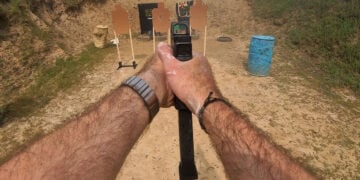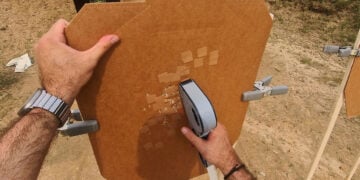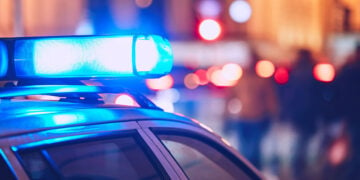
In the CCW community, we spend a lot of time training, preparing, and discussing a potential self-defense shooting and the moments leading up to it. All of this is a good thing, preparing us to deal with a horrific moment as best we may and minimize harm or danger to the innocent. However, in the detailed discussion of tactics and training, I think we tend to overlook something almost as important:
What to do after a self defense shooting takes place?
Frankly, it’s likely to be awful under the best of circumstances. So what can you do?
As always, a lot has been written on the subject—thought not as much as I’d like. The key points are these.
- Take care of the immediate concerns first—does someone need first aid? Is there another potential threat?
- Stay put and call 911. If you’re unable to do so, designate someone else specifically to call 911. Remember that bystander effect makes a general “someone call 911!” likely to fail.
- If you end up calling 911, the following guidelines regarding what to say come strongly recommended:
- Identify yourself.
- Briefly explain what the aggressor did – he threatened you, assaulted you, tried to kidnap or rape you, etc. Do not get into details at this point, you merely want to establish that you were the victim of a crime.
- If the aggressor or his buddies escaped, briefly describe them to the officer.
- If you are wounded or think you might be wounded, ask to go to the hospital.
- If there is any important evidence or witnesses about, point them out to the officer.
- Tell the officer that you want to talk with your lawyer before giving a more complete statement.
- If you are hurt, or think you might be hurt, then ask to go to the hospital.
- You have the right to remain silent—so use it! You’re under more stress than you may realize, so keep quiet until your lawyer arrives.
https://www.youtube.com/watch?v=i8z7NC5sgik
- You’ll need a lawyer. I recommend talking to one as part of your CCW training, in part about how to handle the aftermath of a self defense shooting. If you’re involved in such a shooting, you’ll likely be arrested. Let your attorney do the talking for you.
- When the cops arrive on scene, cooperate with them. They don’t know that you’re the good guy, just another person with a gun. Do what they say, keep your mouth shut, stay safe.
I won’t go into detail about how to handle a police interrogation after a self-defense shooting. Frankly, you need to have your attorney there and let them help you through that. You have no obligation to speak until your lawyer arrives, and you cannot be penalized for staying silent until they get there.
If all goes well, you’ll be released from police custody fairly quickly. My advice at this point? Make an appointment to talk to your attorney the next day and go home. Don’t stop by the bar for a beer, don’t drop by your friend’s house. Go home, tell your spouse what happened, and lie low for a few days. There might be a media response to your incident—don’t get involved, just let it blow over. Don’t talk about what happened to your friends or acquaintances; something like that might come back to haunt you. “My lawyer told me not to discuss this with anyone” is an appropriate response. Listen to your lawyer.
On a final note: you’ve been involved in a violent incident, even if the shooting was justifiable self defense. Dealing with that can be difficult, and I recommend strongly that you consider getting some professional help for a while. A lot of things come to the surface and times like these, and it could be good to have someone guide you through it.
I hope you never need this information. Stay safe out there.









